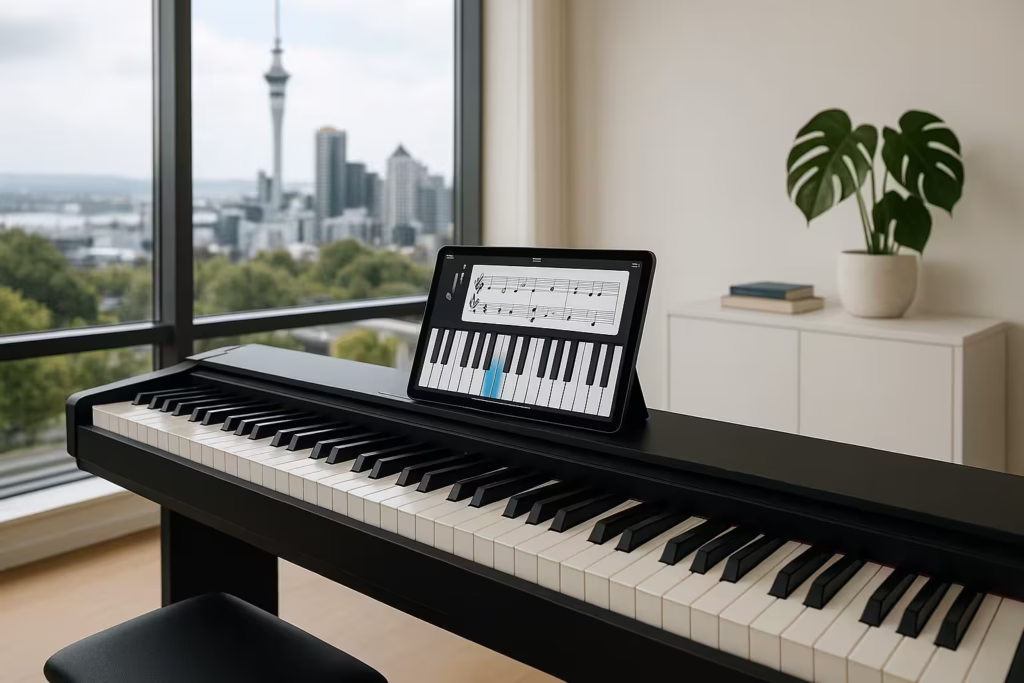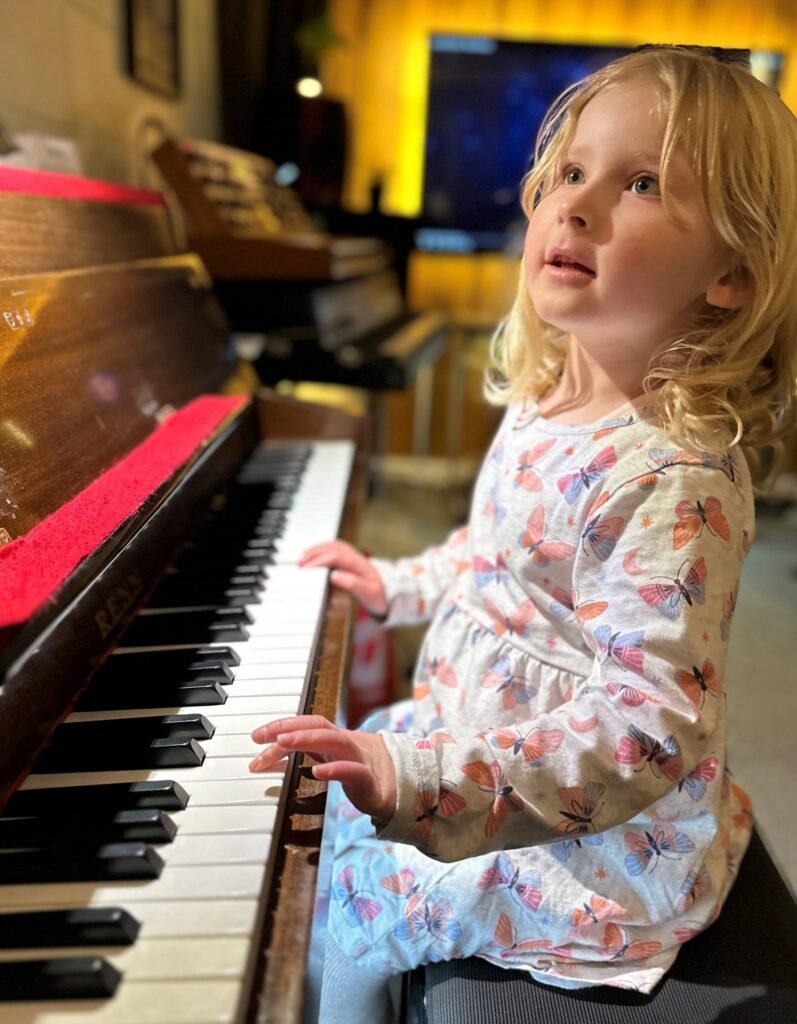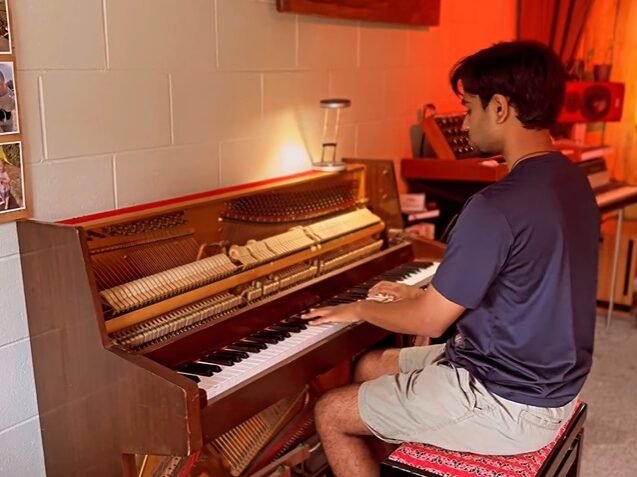The best apps to learn piano in 2025 offer interactive lessons, engaging features, and personalized feedback. These top-rated apps make learning fun and effective whether you are a beginner or an advanced student.
- Introduction
- Section 2: Exploring App Features
- Practical Applications of Piano Learning Apps
- Why Choose Timothy William for Best Apps to Learn Piano Guidance
- Frequently Asked Questions
- What are the best apps to learn piano in 2025?
- Can beginners use these piano apps effectively?
- How do piano apps provide feedback on my playing?
- Do I need a piano to use these apps?
- Are there free versions of these apps available?
- Can these apps replace traditional piano lessons?
- Are there apps specifically for classical piano pieces?
- How can piano apps help students in Auckland?
In the digital age, discovering the best apps to learn piano has transformed the way many approach music education. With the rise of user-friendly technology, enthusiasts and beginners alike can now access top-notch learning resources directly from their mobile devices. This guide aims to introduce you to a curated list of outstanding apps in 2025 that cater to various skill levels and learning styles. For piano aficionados in Auckland, especially those connected with Timothy William’s distinguished instruction, these apps can complement traditional lessons and offer additional insights. As we explore these applications, the focus will be on accessibility, content quality, and adaptability to different learning needs.
App Integrations and Features
The capabilities of modern piano learning apps extend beyond mere note recognition or video tutorials. With advancements in artificial intelligence and machine learning, these apps increasingly provide personalized learning experiences. They can assess a student’s performance, give real-time feedback, and structure lessons based on individual progress. For instance, features like interactive sheet music and adaptive exercises are becoming standard. These innovations empower learners by catering to their pace and understanding, enabling a more tailored educational journey.
Choosing the Right App for You
When selecting an app to enhance your piano lessons, it’s crucial to consider your goals, current skill level, and preferred learning style. Some apps emphasize classical training, focusing on scales, arpeggios, and theory, while others might concentrate on popular music pieces. Furthermore, integration with physical instruments or compatibility with smart pianos can significantly enhance the learning experience. Whether you’re a casual player or honing your skills under the guidance of an expert like Timothy William in Auckland, choosing the right tool that aligns with your objectives is essential for sustained progress.
Among the vast array of options, certain apps stand out due to their comprehensive instructional content and intuitive design. In 2025, the best apps to learn piano are those that not only teach but motivate and inspire continued practice and improvement. As we delve into specifics, consider how each app can fit into your routine and support your musical ambitions.
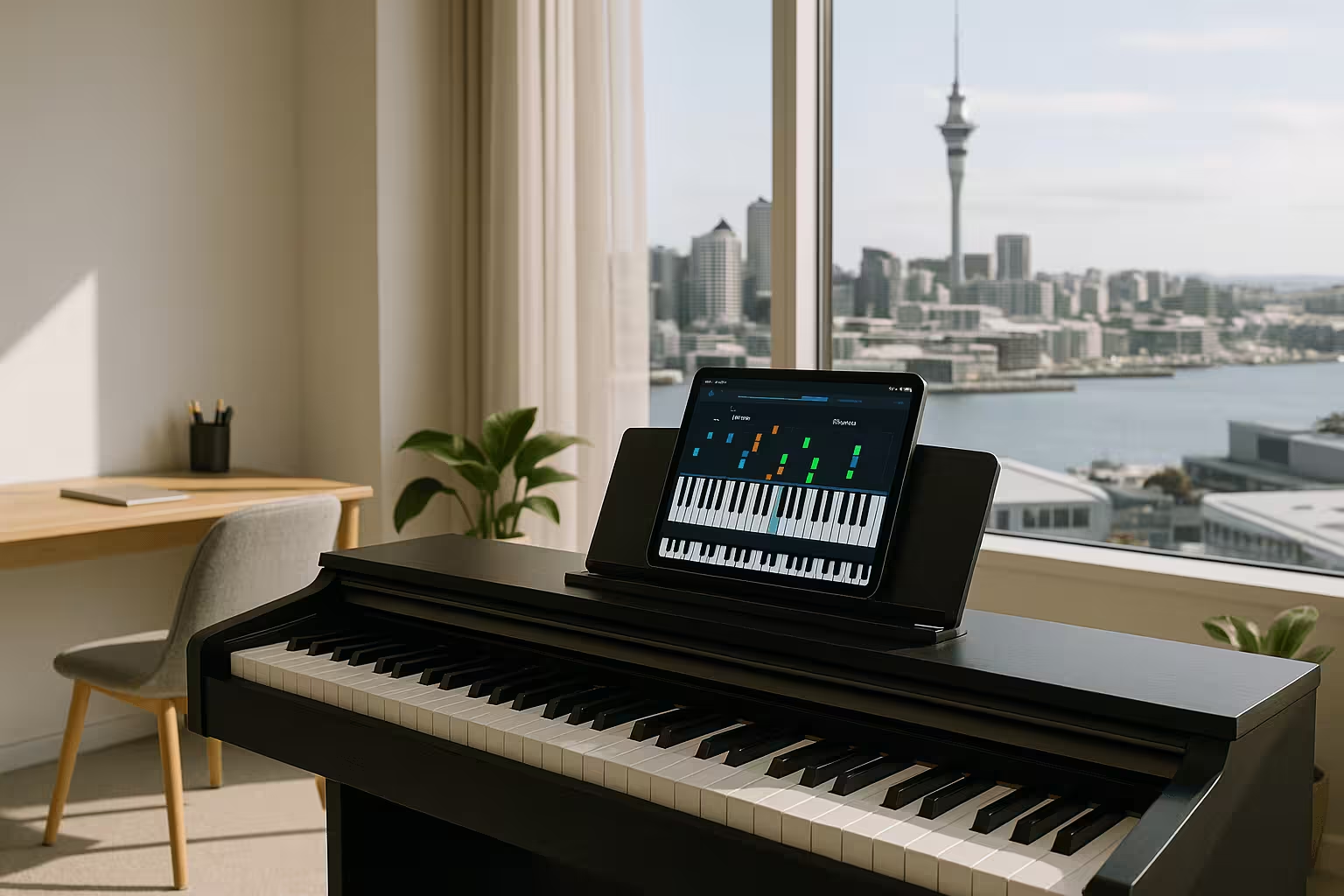
Section 2: Exploring App Features
As the digital landscape continues to evolve, the realm of music education has embraced a transformative approach through cutting-edge applications. In 2025, the best apps to learn piano are incorporating innovative features that deeply engage users and enhance the learning experience. Whether you’re a novice pianist embarking on your musical journey or an experienced player aiming to refine your skills, these apps offer a range of features that cater to diverse learning needs.
AI-Driven Feedback
One of the standout innovations in piano learning apps is the integration of artificial intelligence to provide real-time feedback. AI-driven feedback engines assess a user’s performance by analysing timing, accuracy, and articulation. This capability not only helps in fine-tuning skills but also offers personalised advice tailored to an individual’s progress. With the increasing sophistication of AI, learners receive detailed analyses akin to those provided by a professional piano teacher, making it an invaluable resource for those practising independently. Such technology is a game-changer for learners in Auckland and beyond, allowing them to self-correct and grow autonomously.
Interactive Learning Tools
Interactive learning tools are reshaping how students engage with piano lessons. In 2025, many apps incorporate gamified elements, including challenges and quizzes that make practice sessions more vibrant and engaging. These tools are designed to bolster motivation and sustain interest by providing immediate rewards and recognitions, simulating an exciting learning environment. Furthermore, features like virtual duet capabilities and sheet music libraries allow users to expand their repertoire and attempt more complex compositions at their own pace. This encourages exploration and creativity, essential aspects of a fulfilling piano learning journey.
Beyond just practice, interactive tools offer structured paths that guide learners through various skills and theories in a coherent manner. They ensure a comprehensive understanding, which is crucial for progressing to more advanced levels. These tools have made it feasible for anyone, anywhere, including aspiring pianists in Auckland, to pursue music education with robust resources at their fingertips.
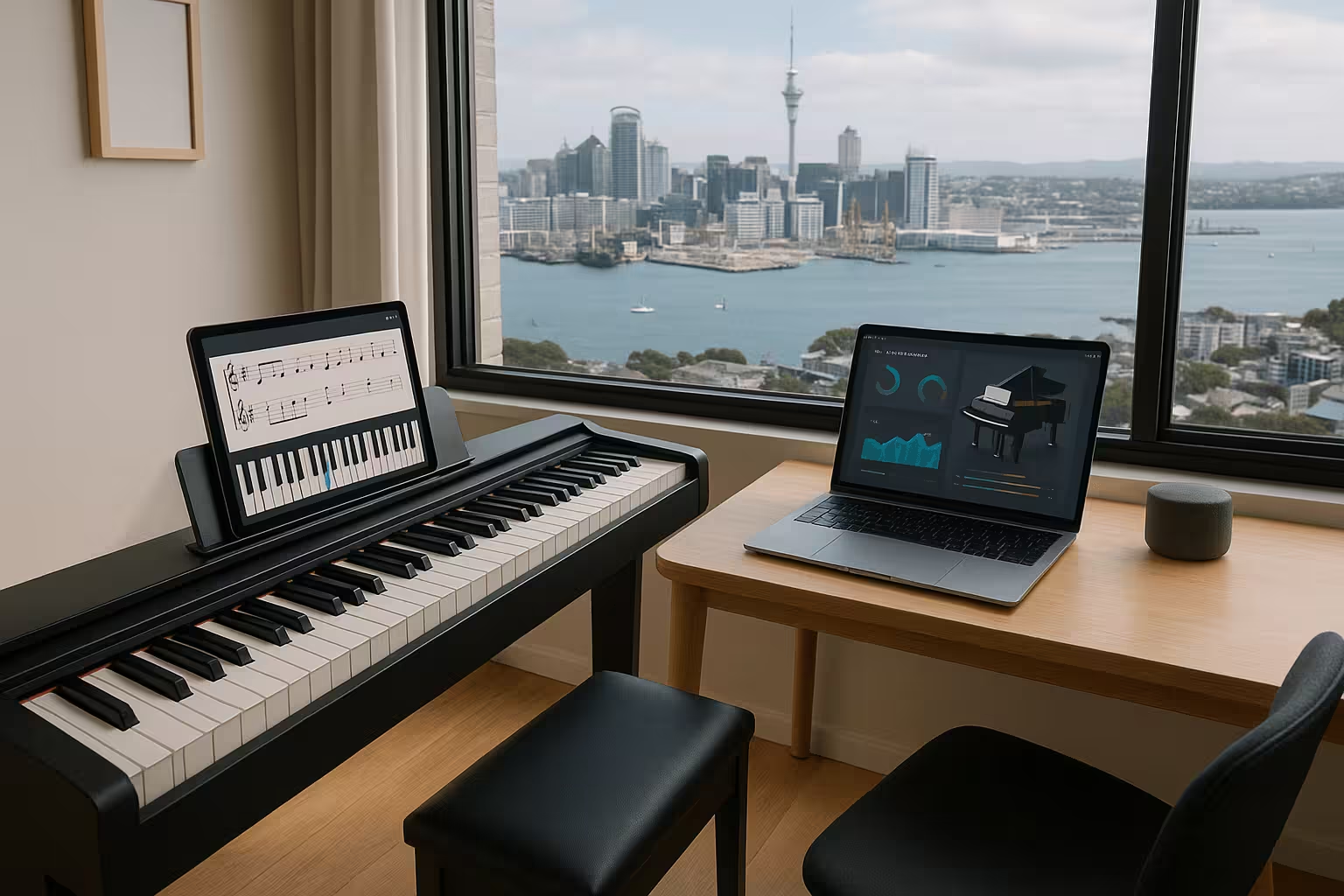
Practical Applications of Piano Learning Apps
The realm of digital piano education has advanced remarkably, with numerous apps offering expansive tools and techniques to enhance learning. Leveraging technology not only simplifies the journey for aspiring musicians but also brings unique advantages that traditional methods might lack. This section illuminates how various real-world scenarios benefit from integrating piano learning apps.
Individualised Learning Pathways
Piano learning apps have redefined personalisation in music education by crafting study plans aligned with individual learning goals. Unlike one-size-fits-all approaches, these apps use AI algorithms to track progress and adapt lessons accordingly. For instance, if you consistently struggle with a particular technique, the app may suggest additional practice or tutorial videos catering to that specific skill. Notably, some apps include features like adaptive difficulty settings and custom exercises, creating a tailored learning experience that is both challenging and attainable.
Moreover, such bespoke learning pathways ensure inclusivity, addressing the needs of learners at different levels. Beginners might receive simplified song selections, while more advanced users could explore complex compositions. This adaptability allows progress at one’s own pace, eliminating the frustration often associated with rigid curriculums.
Enhancing Practice Efficiency
Optimising practice sessions is crucial for solidifying the foundation of musical skills. Piano learning apps are equipped with tools that promote effective practice routines, such as metronomes, tempo adjustments, and sheet music annotations. These apps enable learners to focus meticulously on timing, rhythm, and dynamics, substantially improving technical precision.
Additionally, features like practice logs and performance analytics provide insights into one’s growth over time. This data-driven approach helps in identifying areas requiring more attention and tracking improvements, incentivising continuous advancement. Gamification elements, such as achieving milestones and ranks, further motivate learners, making practice sessions engaging and rewarding.
Community and Collaboration
Finding motivation can sometimes be challenging when learning an instrument solo. However, many piano learning apps incorporate community features enabling collaboration with peers and access to a global support network. Through shared platforms, learners can participate in group challenges, contribute to forums, and even upload their performances for feedback.
This aspect of collaborative learning mimics traditional music classes’ group dynamics and provides social interaction, thus overcoming the solitude typically faced in independent learning. Connecting with a community from Auckland and beyond fosters a supportive environment that encourages persistence and artistic growth.
The integration of these community-based elements transforms apps into more than just educational tools—they become vibrant ecosystems where musicians share, learn, and grow together.
As we’ve seen, these apps offer a plethora of features that extend beyond typical learning methods, providing enriched, customisable, and efficient educational experiences. The following section will delve into why Timothy William is the ideal choice in Auckland for these innovative digital piano learning approaches.
Why Choose Timothy William for Best Apps to Learn Piano Guidance
When it comes to enriching your piano learning experience in Auckland, no one understands the local music scene better than Timothy William. As a leading piano teacher in Auckland, New Zealand, Timothy William not only provides nuanced insights into selecting the best apps to learn piano but he also integrates these tools into his personalised piano teaching methods, ensuring each student maximises their learning potential.
Experienced Local Experts
Timothy William is renowned for his expertise in piano instruction, offering tailored lessons that seamlessly blend traditional and digital teaching methods. His localised knowledge ensures that learners in Auckland receive guidance that is both culturally relevant and musically enriching. With a deep understanding of the latest technological advancements in music education, he empowers students to harness the full potential of piano learning apps, enhancing their musical abilities with practical, real-world applications.
What Sets Us Apart
What truly makes Timothy William stand out is his commitment to student satisfaction and his innovative teaching approach. With years of experience in the music industry, he has cultivated a teaching philosophy that prioritises a student-centred approach, tailoring lessons to meet the unique needs of each learner. Timothy William consistently receives glowing reviews from his students, who appreciate his passion, patience, and commitment to excellence. Additionally, by linking his teaching methods with technologically advanced piano learning applications, he provides a comprehensive learning experience that extends beyond traditional practice.
For those interested in taking their piano skills to new heights, exploring Timothy William’s methods through his Piano Lessons in Auckland is highly recommended. Encountering his methods firsthand is sure to provide insight and inspiration in improving one’s musical journey.
Contact Tim
In the next section, we will address “Frequently Asked Questions” to clarify any common queries you may have about the best apps to learn piano, ensuring you proceed with clarity and confidence.
Frequently Asked Questions
What are the best apps to learn piano in 2025?
In 2025, some of the leading apps for learning piano include Flowkey, Simply Piano, and Pianote, offering features like AI feedback and interactive lessons ideal for students at all skill levels.
Can beginners use these piano apps effectively?
Absolutely! Many of these apps are designed with beginners in mind, providing step-by-step tutorials and simplified lessons that make the learning process accessible and enjoyable.
How do piano apps provide feedback on my playing?
Modern piano apps use your device’s microphone to listen to your playing and offer real-time feedback. This helps you improve accuracy and timing by highlighting areas that need attention.
Do I need a piano to use these apps?
While having a piano or keyboard is ideal, many apps offer visual guides and exercises that can be followed without one, perfect for on-the-go learning.
Are there free versions of these apps available?
Yes, many apps offer free versions or trial periods that allow you to explore basic features and determine if it’s a good fit for your learning style.
Can these apps replace traditional piano lessons?
While piano apps provide convenience and flexibility, they complement rather than replace traditional lessons. They are a great way to enhance your skills and practice outside of formal instruction.
Are there apps specifically for classical piano pieces?
Yes, some apps focus specifically on classical music and offer libraries of pieces along with tutorials to guide you through the complexities of these works.
How can piano apps help students in Auckland?
Piano apps provide Auckland students accessibility to quality music education resources, enabling learning at their own pace and schedule, which is especially beneficial for busy schedules.

